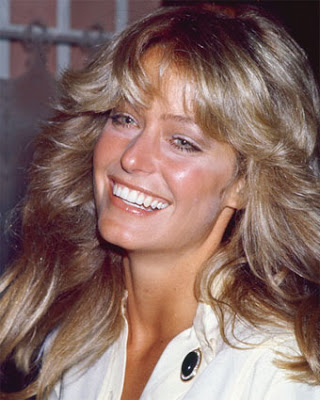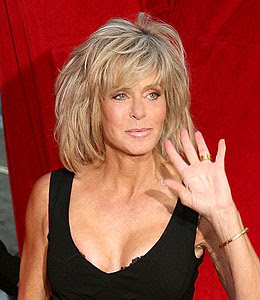
Survivors remember…
How could the Academy forget Farrah?
By Jody Schoger / The Rag Blog / March 11, 2010
American icon and Emmy-award winning actress Farah Fawcett was notably absent in the traditional memorial included each year as part of the annual Academy Awards ceremony, which aired last Sunday. Roger Ebert, writing on Twitter, quickly noted, “No Farrah Fawcett in the memorial tribute? Major fail.”
Major fail is right. From a purely historical standpoint, based on the length or her career and her social impact, she should have been there, along with Bea Arthur.
But perhaps the omission is as it should be. Like icons before her (Marilyn Monroe comes to mind) Ms. Fawcett did not seem like part of Hollywood, or even of Hollywood. In both cases, separating the woman from the image became as intriguing as the image itself.
In the real world I think Ms. Fawcett was an incredible artist who unintentionally saved her best public work until last.
She gave the most extraordinary gift of her intelligence, grace and spirit in Farrah’s Story, the no-holds-barred documentary that chronicled her struggle with the cancer that prematurely ended her life last summer. Both she and Michael Jackson died on the same day.
In 2006 Ms. Fawcett was diagnosed with anal cancer, one of those cancers people don’t talk about very much, if at all. In the last 30 years its incidence has risen by 78% in women, according to an article in US News & World Report. While only one in 640 women will be diagnosed with anal cancer over the course of their lifetime, not even half of anal cancers are detected early, when they are most easily treated.
The fact that this engaging woman, who fought on many fronts to retain her privacy, chose to let us in on this last chapter of her life certainly says more than I can. Farrah’s Story shows us a rare courage and also the unflinching nature of enduring friendship and love. Alana Stewart is by her side filming through treatments, illness, laughter, and tears. If you’ve had cancer, you know what these moments feel like. Of all the moments shared, one of my favorite is one all of us can identify with: the two friends cooking dinner and laughing in the kitchen.
When the Academy of Motion Pictures Arts and Sciences decided “that we can’t include everybody” in their “memoriam,” they rendered the rest of the segment meaningless.
So to Ms. Fawcett? What a life you lived. Thank you.
[Jody Schoger is a writer, public relations consultant, and cancer advocate who lives in the Woodlands near Houston. He blogs at Women with Cancer.]
The Rag Blog



















Farrah Fawcett was a television actress, not a film actress. Her extremely skimpy cinematic resume includes such embarrassments as Sunburn, Cannonball Run, and Myra Breckenridge. I think the Academy’s decision was correct. Of course, they should also have excluded Wacko Jacko on the same grounds. Consistency would be good!
She deserves to be included based on her triumphant exit strategy alone… filming her battle with anal cancer and sharing it with the world.
whether or not it was a snub by the Academy, I think that Jody’s blog helps us see Farrah in a new light — as a selfless and brave woman who decided to go public about a difficult and shunned topic… and who deserves to be remembered in her own right
The Academy says it was a decision made based on their perception that she was more famous for being on TV rather than movies. So how do they reconcile that with including Michael Jackson? He only made one movie, and was more famous for being a recording artist. They just don’t want to admit they made a mistake.
Farrah Fawcett’s death from cancer marked a sad passing for me and one of those unpleasant reminders of my own creeping mortality. When she was in school at UT, I used to tag along with my brother’s frat brothers as they walked by the Tri-Delt house just hoping to get a glimpse of her. (The alcohol-fueled anarchy of the Kappa Sigma fraternity generally ruled actual fraternizing with the Tri-Delts impossible, and on those occasions the girls let judgement lapse, they invariably regretted the decision.) Then she became famous, mostly for her incredible beauty, which ultimately tagged her as a light-weight in the acting world. Her beauty became an odd curse which she fought by taking off-type roles such as the besieged wife in “The Burning Bed”.
For me it is hard to believe that she might even age, much less die. In the manner that she treated her demise – the sheer honesty of her documenting what she assumed would be her triumph over cancer – overcame any of the sideshow qualities of her television and tabloid appearances in her later years. It also lent substance that belied the assumed intellectual vacuity with which she was labeled by detractors who didn’t even know her. She deserved recognition by the Academy and better treatment by her peers.
Thanks to all of you for your comments and observations. I saw her in such a new light with the release of her documentary. She entered our national consciousness with beauty and her life ended much too soon.
warm regards,
Jody
I remember a movie she did concerning violence against women, which at the time took some courage on her part (the woman burned her husband alive). She played the part very well, I was surprised.
I will never forget seeing Farah Fawcett for the first time while standing in the line for dinner at Blanton dorm at UT in 1965, at which moment I spoke directly to God saying,”This is NOT fair!” She was truly the most incredibly beautiful creature I’d ever seen in my life.
My room mate and friend was in the “Ten Most Beautiful” with Farah, so I saw her up close quite often, although she treated me rather like a piece of furniture, and thus I did not like her much at the time. However, I suspect most of those ladies are now the wives of right win fascist Republicans. Not Farah.
She was a very interesting character, a unique American sort of conflicted, strange phenomenon, and superpower phenomenon, and I think she should have been included.